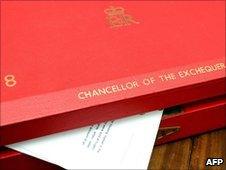Fiscal watchdog downgrades UK growth forecast
- Published

The new estimates will form the basis for George Osborne's first Budget
The new independent fiscal watchdog has downgraded the economic growth projections for the UK economy.
The Office for Budget Responsibility (OBR) predicts the economy will expand 2.6% in 2011, down from the 3% to 3.5% estimate given in Labour's last Budget.
The lower figure will likely increase the impetus of the coalition government to cut public spending, as lower growth means fewer tax revenues.
Yet the OBR also says the deficit and debt will not be as bad as forecast.
It predicts that the UK's public deficit will fall, down to 10.5% of GDP in the 2010-11 financial year, from the 11.1% estimated by Labour.
For overall net government debt - the sum of all borrowing - the OBR estimates this will decline to 62.2% of GDP in 2010-11 from the previous estimate of 63.6%.
Former Labour Chancellor Alistair Darling said the OBR figures "show that borrowing will be less than I forecast, so the government doesn't have the excuse to raise VAT, which it is planning".
He added that if the government cuts public spending too aggressively it could send the UK into a double-dip recession.
However, the OBR says the structural deficit - the part of the deficit that is not automatically reduced by economic growth - will widen from Labour's prediction of 7.3% of GDP in 2010-11 to 8%.
This is the most difficult part of the deficit to tackle, and Chancellor George Osborne said the OBR figures "couldn't be clearer".
"It's damning evidence that the mess the previous Government left behind is even bigger than we thought," he said.
The chancellor told the House of Commons that his government had "inherited one of the largest budget deficits in the world and a larger structural deficit than we thought.
"We can only speculate as to why the government published rosy forecasts for a trampoline recovery weeks before the general election," he said.
'No permanent damage'
Mr Osborne is due to unveil an emergency Budget on Tuesday of next week, and has pledged to cut public spending to reduce the deficit.
The OBR will issue a new set of figures at the Budget, taking into account the coalition government's new tax and spending plans.
Despite downgrading the growth figures, OBR chairman Sir Alan Budd said he did not think the recession had caused "permanent damage" to the economy.
He added that the changes to the forecasts were "all within the normal range of uncertainty".
'Death spiral'
Deputy Prime Minister Nick Clegg said that the government must act now to cut public debt, or risk losing its ability to protect people in need.
He argued that cutting spending is the "progressive" option which will allow the coalition to bring down the deficit in a way that delivers fairness.
"We are going to see through the deficit reduction that is an absolute prerequisite for turning Britain's fortunes around," he said.
However, one senior economist, David Blanchflower, a former member of the Bank of England's Monetary Policy Committee, shared Mr Darling's concerns about the risk of a double-dip recession.
He told the BBC's Today programme that cutting public spending could risk sending the UK economy into a "death spiral".
"I think the danger is a phrase that Ben Bernanke used, it is called the death spiral," he said.
Mr Blanchflower's fear is that a big cut in public spending will hurt the private sector.
"There is no evidence that the government is going to create private demand, this could push us back into double-dip recession," he said.
'Huge problem'
The Office for Budget Responsibility (OBR) was set up by the Conservatives last December, when they were still in opposition.
It is responsible for providing an independent assessment of the state of the public finances.

The British Chambers of Commerce (BCC) gave the first OBR figures a cautious welcome.
"The new forecasts are more realistic than those in the March budget, but the growth expectations are still overly optimistic," said BCC chief economist David Kern.
"For the world economy, the expectation that growth will return fairly rapidly to the levels seen before the recession is too rosy - especially given the current eurozone problems and worrying signs that the US recovery may be stalling."
Prime Minister David Cameron warned last week the OBR figures would "show the scale of the problem we are in today".
He added that dealing with the deficit - which totalled £156bn in the last financial year - would affect "our whole way of life".
- Published9 June 2010
- Published15 June 2010
- Published8 June 2010
- Published7 June 2010